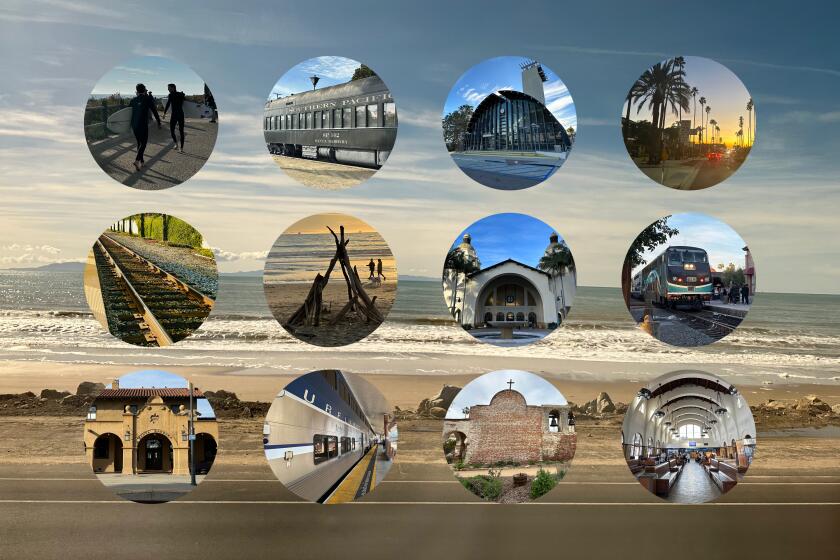Shore Patrol
I had booked a Caribbean cruise to get away from crises, decisions and hysteria. But on Day Five, I was flailing my arms at a deckhand, one foot planted on the dock at St. Martin and the other on the gangway of a shore boat waiting to take me to my cruise ship.
It was the last boat back to the Celebrity Line’s palatial Zenith, riding at anchor in the harbor, and I knew one passenger was missing. On the way to the dock, a young woman had discovered some unspent dollars and ran back to Front Street to scoop up last-minute duty-free loot.
“Don’t let the tender leave without me,” Amy called over her shoulder. I foolishly nodded OK.
“Madame, please, all aboard,” said the deckhand. “Your ship sails in 20 minutes. We can’t wait anymore.” I stood fast, wildly considering stepping ashore to stay with Amy. But the woman was just a shipboard acquaintance. Where did duty end?
The deckhand’s firm hand on the small of my back answered the question, and we were under way. Like the Ancient Mariner, I repeated my tale of woe to the passengers as we sailed to the mother ship. The deckhand absolved himself with a shrug. “Whenever we wait for somebody, it turns out that they took an earlier boat. Your friend probably has had her shower and is on her second mai tai. They always are!”
If there’s one thing cruise lines drum into your head during shore excursion briefings, it’s “don’t miss the ship.” If you do, you’ll have to make it to the next port on your own, and at your own expense.
As it happened, Amy sailed up just before the ship’s gangway was raised, having been delivered by another line’s shore boat. This last-minute save is common courtesy among cruise lines, I learned later, when I asked a ship’s officer what would have happened to my bikini-clad friend if she’d been left on the island with no toothbrush, no cash, no credit cards or ID.
“The port agent would have helped her,” he said offhandedly. I looked puzzled.
“That’s why his name and phone number are listed in the daily activities program,” he said.
“The port agent?”
“Everyone around the dock knows our agent and someone would get him for you,” he answered. The officer went on to explain that if the ship had sailed without Amy but was still in reasonable range, the agent could have sent her out by tug or chartered boat, or he could have put her on the vessel that goes out to fetch the harbor pilot who guides the ship out of port.
Failing these measures, the agent would have called for authorization from the ship’s captain to lay out funds for meals, hotel and a plane ticket to the next scheduled port. Later, the cruise company, of course, would bill her for the works.
Back in my cabin, I scanned the program that had been slipped under my cabin door that morning. The agent for St. Martin was listed in a small box on page two but without any explanation. Most cruise lines list their port agents there and in the informational pamphlet that comes with your ticket. However, passengers are merely instructed that they can receive mail and cables through the agents at each port. Not a word about their role in saving a wayward Amy.
I have since asked several cruise line officials why many passengers are left in the dark about this important agent function. The best answer I got was a tongue-in-cheek reply from Joan Brower, of G.C.I. Group in New York, which does public relations for deluxe Celebrity Cruises, based in Miami.
“You can understand why ships might not want to publicize this service,” she said. “They probably don’t want people to think they can miss the boat.”
*
The duties of the port agent go far beyond delivering mail or rescuing stranded passengers. In each of their ports of call, shipping companies contract with local agents for marine services and emergency passenger aid. An agent can be a lone man with a phone on a remote Pacific island or part of a large maritime agency in a megaport such as Los Angeles, Athens or Hong Kong. Most deal not only with passenger ships but also freighters, tankers and inter-island ferries
Matthew Sams, director of port operations for giant Carnival Cruise Lines, calls his agents “the eyes and ears of the port.”
“Our company is based in Miami, but our ships call throughout the world,” Sams said. “Agents know the local rules, regulations and fees, the docking and anchorage locations, berthing arrangements, customs and immigration requirements. They deliver supplies and mail to the ship and make sure that repair and emergency services are ready if needed. They schedule the local harbor pilots and arrange for prompt boarding by customs and immigration officials, so that passengers can get ashore as soon as possible.”
One of the biggest full-service maritime agencies in the country is Eller & Co., of Ft. Lauderdale, which serves 26 cruise lines--including such prominent ones as Holland America and Cunard--in several southern Florida ports. Eller’s duties include the handling of stevedoring and terminal operations.
Henry E. Reynolds, manager of agency operations for Eller, considers stragglers who miss their ships a diminishing problem.
“Today’s experienced cruisers know that ships mean business about departure times,” he explained. “Our agents spend more time dealing with other emergencies, such as getting ambulances and doctors to the dock to meet distressed passengers or even finding an attorney for someone who has run afoul of the law. We’re always forwarding delayed luggage to the ship’s next port or figuring out where to send left-behind medicines, glasses and evening clothes that passengers forgot to pack for the captain’s dinner.
“Years ago, when cruise passengers tended to be the affluent elderly, agents devoted considerable effort to unraveling red tape in foreign ports to bring home bodies of people who had died at sea,” said Reynolds. “Now that cruising is popular with all ages, that’s not a major problem on most ships.
“Arranging flights for travelers who need to leave the cruise midstream is an important port agent service,” said Michael Ronan, director of port planning for Miami’s Royal Caribbean Cruise Lines. “Family or business emergencies back home are the most common reasons, but sometimes a passenger doesn’t like a turn in the weather or just wants to get off the ship,” he said.
“Those arrangements are easy to make compared to the problems of a passenger who gets stuck in a foreign port without his passport and must fly to catch the ship in another country in Europe or Asia . . . . When you enter a foreign country you are required to show a return ticket or proof that you’ll be traveling onward,” Ronan added.
“That’s when the port agent puts his consular connections to work to legally expedite your trip,” he said. “The agent in the next port takes responsibility for you with immigration and the ship’s captain authorizes the agents to advance needed funds to the passenger.”
“Cruise passengers should always write down the port agent’s name, address and phone number before going ashore,” advised Jim Lida, assistant director of passenger development at Port Everglades, in Fort Lauderdale. “But remember,” he warned, “the agent is there to help only in a genuine emergency. He is not a concierge.”
With some exceptions. One night, I was standing with two other passengers from Cunard’s Vistafjord on a deserted dock in Palma de Mallorca, hoping for a taxi to take us to town. Finally, a man in a Fiat pulled up and started to board the ship. Then, noting our situation, he got back in his car and sped off to find us a cab.
He turned out to be the local port agent going the extra mile.
Sign up for The Wild
We’ll help you find the best places to hike, bike and run, as well as the perfect silent spots for meditation and yoga.
You may occasionally receive promotional content from the Los Angeles Times.



